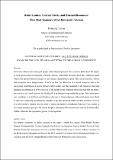Files in this item
Rebel leaders, internal rivals, and external resources : how state sponsors affect insurgent cohesion
Item metadata
| dc.contributor.author | Tamm, Henning | |
| dc.date.accessioned | 2018-08-21T23:40:09Z | |
| dc.date.available | 2018-08-21T23:40:09Z | |
| dc.date.issued | 2016-12-01 | |
| dc.identifier | 246307828 | |
| dc.identifier | 3367fc88-1aa3-4ba7-a594-247b415280ce | |
| dc.identifier | 85021038125 | |
| dc.identifier | 000392925300002 | |
| dc.identifier.citation | Tamm , H 2016 , ' Rebel leaders, internal rivals, and external resources : how state sponsors affect insurgent cohesion ' , International Studies Quarterly , vol. 60 , no. 4 , pp. 599-610 . https://doi.org/10.1093/isq/sqw033 | en |
| dc.identifier.issn | 0020-8833 | |
| dc.identifier.other | BibCode: NIS246307828 | |
| dc.identifier.other | ORCID: /0000-0002-0051-5632/work/61133214 | |
| dc.identifier.uri | https://hdl.handle.net/10023/15853 | |
| dc.description.abstract | Civil wars often feature insurgent groups with external sponsors. Yet, we know little about the impact of such sponsorship on insurgent cohesion. Indeed, researchers disagree about the conditions under which state sponsorship encourages or discourages organizational splits. This article presents a theory that reconciles these disagreements. I focus on how the allocation of external resources affects the intra-group distribution of power between rebel leaders and their internal rivals. Sponsors that help maintain an imbalance of power in favor of the leader foster cohesion; those that help flip the imbalance in favor of a rival increase the likelihood of an internal coup within the group. Only when sponsors contribute to a shift from an imbalance of power to balanced power is the rebel group more likely to split into competing organizations. I further argue that sponsors reallocate their resources in favor of a rebel leader’s internal rival in order to punish the leader for undesired behavior. Case studies of two major insurgent groups—the Sudan People’s Liberation Movement/Army and the Lebanese Hezbollah—illustrate the explanatory power of my argument. | |
| dc.format.extent | 12 | |
| dc.format.extent | 230150 | |
| dc.language.iso | eng | |
| dc.relation.ispartof | International Studies Quarterly | en |
| dc.subject | JZ International relations | en |
| dc.subject | BDC | en |
| dc.subject | R2C | en |
| dc.subject.lcc | JZ | en |
| dc.title | Rebel leaders, internal rivals, and external resources : how state sponsors affect insurgent cohesion | en |
| dc.type | Journal article | en |
| dc.contributor.institution | University of St Andrews. School of International Relations | en |
| dc.identifier.doi | https://doi.org/10.1093/isq/sqw033 | |
| dc.description.status | Peer reviewed | en |
| dc.date.embargoedUntil | 2018-08-22 |
This item appears in the following Collection(s)
Items in the St Andrews Research Repository are protected by copyright, with all rights reserved, unless otherwise indicated.

